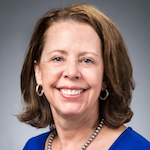Conference to give educators tools to encourage difficult political discussions, talk about elections
With rhetoric ratcheting up ahead of the November elections and a new school year just underway, an upcoming conference hosted by the UW–Madison School of Education couldn’t be more timely or relevant.
“Teaching About the 2018 Elections: Preparing Students for Political Engagement,” will run from 8 a.m. to 3:30 p.m. Sept. 22, in Grainger Hall.
Teaching about elections is one of the best opportunities educators have to prepare young people for political engagement, says School of Education Dean Diana Hess. She has spent much of her career researching the impact of school-based civic education programs and how students experience and learn from discussions of highly controversial political issues. Such discourse is at the heart of a democratic education, Hess adds, and these discussions help students understand diverse points of view and become more politically engaged adults.
Yet due to the polarized nature of politics in the United States, conversations can quickly become emotionally charged or devolve into personal attacks, leaving educators unsure how to teach about electoral politics in a way that is engaging, respectful of all points of view, and draws upon the best and most current information.
The Teaching About the 2018 Elections conference is designed to provide educators the tools, resources and confidence they’d need to teach about electoral politics in a way that is engaging but respectful to differing points of view. The day-long event draws upon the best and most current information, and is geared toward K-12 public or private school educators and administrators, preservice teachers, graduate students and social studies professors.
“Whether it’s immigration, gun control, abortion, gay rights or any other hot-button topic — avoiding politics and controversy in the classroom isn’t the answer,” says Hess, who holds the Karen A. Falk Distinguished Chair of Education.
Hess notes research has shown that the more students know about elections and political issues, the more likely they are to be engaged citizens.
“Teaching about politics in the classroom is vitally important and not something that should be viewed as an elective or as optional,” says Hess, who serves on the board of the Constitutional Rights Foundation Chicago and the iCivics Scholars Advisory Board. “Many issues in politics are directly affecting young people, and some high school seniors will be eligible to vote in November. Helping students develop their ability to deliberate political questions, to understand other people’s perspectives and to become engaged and knowledgeable citizens is an essential component of our democracy.”
The Teaching about the Elections conference features breakout sessions and two keynote panel discussions, with one on pedagogy and another on journalism. The pedagogical panelists will offer their responses to the question, “What should schools do to encourage young people to be politically involved?” The journalism panel will discuss the current issues facing Wisconsin this election and the role of media in civic engagement. Participants will also get to decide which breakout sessions to attend, with each session designed to be interactive and focused on teaching about issues related to the 2018 November elections.
Each participant can attend three breakouts, with the various sessions falling into four categories:
- Pedagogical strategies: These teach participants how to use particular discussion strategies or other interactive activities in the classroom. Some sessions will be designated as more appropriate for elementary teachers; others will focus on activities for middle and high school teachers.
- Issue forums: These are designed to educate teachers about some of the most important and often controversial issues facing the U.S. and Wisconsin. Issue forums are led by UW–Madison faculty members with content expertise about a particular issue.
- Featured curricula: Some of the most well regarded civic education organizations from around the country will be leading sessions on how to use their lesson plans.
- Administrator sessions: These sessions teach administrators how to support high quality civics teaching in their district.
While schools aren’t the only place students can learn about elections, Hess says they are an ideal space. Hess co-authored with Paula McAvoy the 2014 award-winning book, “The Political Classroom: Evidence and Ethics in Democratic Education.” This book, which is based on a four-year study of 35 teachers and their 1,000-plus students, explores the role of teachers in perpetuating serious, thoughtful political deliberation in schools.
“In schools, people are likely to hear and learn about multiple and competing ideas,” says Hess, who started her career as a high school social studies teacher in Illinois. “In addition, educators have access to quality curriculum and have the training and skills necessary to teach about these controversial topics.”
Complete conference details are available on the Teaching About the 2018 Elections web page.
This conference is funded by the Gibb Democracy Education Fund and the Claudia Grams Pogreba Fund. Mary Hopkins Gibb is a 1955 School of Education alumna. Her husband Bill was a 1953 Wisconsin School of Business alumnus. Claudia Grams Pogreba is a 1970 School of Education alumna.

